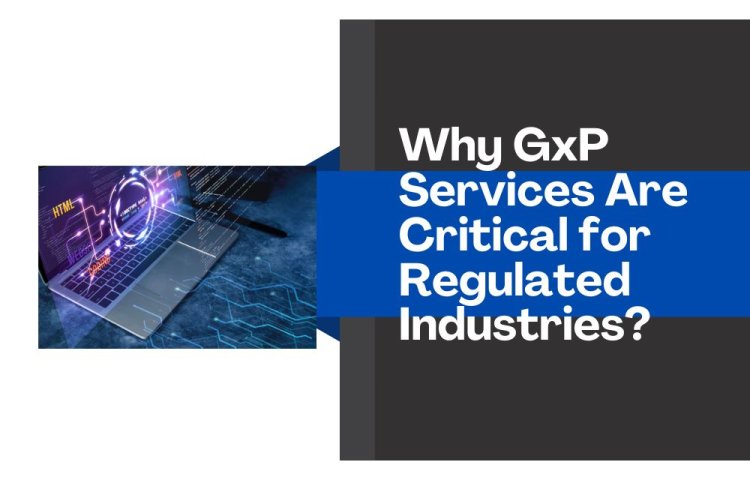Why GxP Services Are Critical for Regulated Industries?

Pharmaceuticals, biotechnology, food production, and medical devices, the stakes are incredibly high when it comes to compliance and quality. These sectors are strictly regulated to ensure that products are safe, effective, and reliable. This is where Good Practice (GxP) services come into play. GxP services are designed to help businesses adhere to the strict guidelines set by regulatory bodies, ensuring that their products meet the necessary safety and quality standards.
In this article, we will explain why GxP services are so important for regulated industries and how they help businesses maintain compliance, improve product quality, and ultimately protect public health and safety.
What Are GxP Services?
GxP (Good Practice) refers to a set of guidelines and regulations that ensure businesses maintain high standards in their operations. These guidelines cover various aspects of production, testing, and distribution and are primarily used in regulated industries. The "G" in GxP stands for Good, meaning that the practices must be of high quality and in compliance with regulations, and the "P" stands for Practice, meaning that the company must implement these guidelines in its daily activities.
Some of the most common GxP guidelines include:
-
Good Manufacturing Practices (GMP): These guidelines ensure that products are consistently produced and controlled according to quality standards.
-
Good Clinical Practices (GCP): These guidelines focus on the design, conduct, and reporting of clinical trials.
-
Good Laboratory Practices (GLP): These are standards for laboratory testing, especially for non-clinical research.
-
Good Distribution Practices (GDP): These guidelines ensure that products are stored, handled, and distributed safely and in compliance with quality standards.
GxP services are typically offered by industry experts or consulting firms, and they help businesses implement these standards into their daily operations to ensure compliance and quality.
Note:- Get in touch with Nex Information Technology Consultancy right now for knowledgeable GxP Services UAE The dedicated staff guarantees adherence to Good X Practice (GxP) guidelines, assisting your company in effectively fulfilling regulatory obligations. Get a consultation right now to make sure your procedures are optimized and in compliance.
Why Are GxP Services So Important for Regulated Industries?
1. Compliance with Regulations
Regulated industries, such as pharmaceuticals, food production, and medical devices, are subject to strict government regulations. These regulations are in place to protect public health and safety by ensuring that products meet high-quality standards.
1.1 Avoiding Legal and Financial Penalties
Failure to comply with GxP regulations can result in significant legal and financial consequences for businesses. For example, if a pharmaceutical company fails to meet Good Manufacturing Practices (GMP) standards, it could face product recalls, costly fines, and even the suspension of its operations. By using GxP services, businesses ensure they meet regulatory requirements, minimizing the risk of penalties and other legal consequences.
1.2 Ensuring Market Access
In many cases, businesses cannot sell their products in certain markets unless they meet the local regulatory requirements. This is especially true for global markets, where products must adhere to the rules and standards of each country. GxP services ensure that companies can prove their compliance, giving them access to global markets and ensuring that their products can be sold and distributed worldwide.
2. Ensuring Product Quality
One of the primary goals of GxP services is to ensure that products are of the highest quality and are safe for consumers. This is especially important in industries like pharmaceuticals and food production, where poor product quality can have serious consequences, including health risks for consumers.
2.1 Consistent Product Standards
GxP services help businesses implement standardized processes that ensure products are consistently manufactured, tested, and distributed. For example, Good Manufacturing Practices (GMP) ensure that every batch of a product is made according to the same high standards, reducing the risk of errors or defects. This consistency is crucial for maintaining the safety and reliability of products in regulated industries.
2.2 Quality Control and Testing
GxP services help businesses establish rigorous quality control and testing procedures. This includes testing raw materials, monitoring production processes, and performing final product inspections. By adhering to these practices, companies can identify and address potential quality issues before they affect consumers. This proactive approach to quality management helps prevent costly recalls and protects the company’s reputation.
3. Risk Management and Safety
Regulated industries face significant risks, especially when it comes to product safety. GxP services help businesses identify, assess, and manage these risks to ensure that products are safe and effective.
3.1 Reducing the Risk of Product Failures
In industries like pharmaceuticals and medical devices, a product failure can have serious consequences for both the company and its customers. GxP services help businesses minimize these risks by ensuring that products are designed, tested, and produced according to strict safety standards. For example, Good Clinical Practices (GCP) ensure that clinical trials are conducted safely and ethically, reducing the risk of adverse effects and ensuring the safety of trial participants.
3.2 Traceability and Documentation
GxP guidelines require businesses to keep thorough records of their processes, tests, and results. This documentation provides an important safety net in case something goes wrong. If a product defect is discovered, businesses can trace the problem back to its source and take corrective action quickly. This traceability also helps businesses demonstrate their compliance with regulations, making it easier to resolve any potential legal or safety issues.
4. Building Trust with Customers and Stakeholders
Trust is a critical factor in any business relationship. When it comes to regulated industries, customers, investors, and stakeholders need to be confident that products are safe, reliable, and of the highest quality. GxP services help businesses build and maintain this trust by ensuring that their operations meet or exceed industry standards.
4.1 Ensuring Product Safety
By adhering to GxP guidelines, businesses demonstrate their commitment to product safety. For example, following Good Manufacturing Practices (GMP) ensures that products are consistently produced with quality control measures in place to reduce the risk of contamination or defects. This commitment to safety builds trust with customers and stakeholders, who are more likely to support a company that prioritizes safety and quality.
4.2 Strengthening Brand Reputation
A strong reputation for quality and safety is one of the most valuable assets a company can have. By following GxP guidelines, businesses can enhance their brand reputation, which can lead to increased customer loyalty, new business opportunities, and better relationships with stakeholders. When a company demonstrates its commitment to compliance and quality, it earns the trust and respect of its customers and partners.
5. Continuous Improvement and Innovation
GxP services are not just about meeting regulatory requirements—they also promote continuous improvement and innovation within businesses. By adopting GxP standards, companies can identify areas for improvement, optimize processes, and foster innovation.
5.1 Process Optimization
GxP services help businesses streamline their operations and eliminate inefficiencies. For example, by implementing standard operating procedures (SOPs) and quality control measures, businesses can reduce errors, improve productivity, and minimize waste. This not only improves compliance but also enhances overall operational efficiency.
5.2 Encouraging Innovation
GxP services provide businesses with the tools and frameworks they need to innovate safely. In industries like pharmaceuticals and biotechnology, new products and technologies are constantly being developed. GxP services ensure that these innovations are introduced in a controlled and compliant manner, minimizing risk and ensuring that new products meet the necessary safety and quality standards.
How GxP Services Are Implemented in Your Business
1. Initial Assessment and Gap Analysis
The first step in implementing GxP services is to conduct an initial assessment or gap analysis. This involves reviewing your current processes, identifying areas of non-compliance, and determining what changes need to be made to meet GxP standards.
2. Standard Operating Procedures (SOPs)
Once gaps have been identified, businesses need to develop and implement standard operating procedures (SOPs) that align with GxP guidelines. SOPs provide clear instructions on how to perform tasks in a consistent and compliant manner, ensuring that employees follow best practices.

3. Employee Training and Education
GxP services also involve training employees to understand and follow the guidelines. This training ensures that everyone in the organization is aware of the regulations and their role in maintaining compliance. Ongoing training is essential to keep employees up-to-date with any changes to GxP regulations.
4. Regular Audits and Monitoring
To ensure continued compliance, businesses need to conduct regular audits and inspections. This helps identify any areas of non-compliance or opportunities for improvement. GxP services often include regular audits to ensure that the business is adhering to all relevant guidelines and regulations.
5. Continuous Improvement
GxP services promote a culture of continuous improvement, where businesses regularly review their processes and make adjustments to enhance quality and compliance. By continuously improving, businesses can stay ahead of regulatory changes and maintain the highest standards.
Conclusion
GxP services are essential for businesses in regulated industries. They help companies ensure compliance with strict regulations, maintain high product quality, and reduce the risk of safety issues. By implementing GxP services, businesses can avoid legal penalties, build trust with customers, and enhance their overall reputation. Whether you’re in pharmaceuticals, food production, medical devices, or another regulated sector, GxP services are critical to your business’s success and long-term sustainability.
To read more articles visit on newswireengine
What's Your Reaction?

















.jpg)